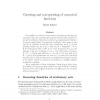Free Online Productivity Tools
i2Speak
i2Symbol
i2OCR
iTex2Img
iWeb2Print
iWeb2Shot
i2Type
iPdf2Split
iPdf2Merge
i2Bopomofo
i2Arabic
i2Style
i2Image
i2PDF
iLatex2Rtf
Sci2ools
APAL
2007
2007
Guessing and non-guessing of canonical functions
It is possible to control to a large extent, via semiproper forcing, the parameters (β0, β1) measuring the guessing density of the members of any given antichain of stationary subsets of ω1 (assuming the existence of an inaccessible limit of measurable cardinals). Here, given a pair (β0, β1) of ordinals, we will say that a stationary set S ⊆ ω1 has guessing density (β0, β1) if β0 = γ(S) and β1 = sup{γ(S∗) : S∗ ⊆ S, S∗ stationary}, where γ(S∗) is, for every stationary S∗ ⊆ ω1, the infimum of the set of ordinals τ ≤ ω1 + 1 for which there a function F : S∗ −→ P(ω1) with ot(F(ν)) < τ for all ν ∈ S∗ and with {ν ∈ S∗ : g(ν) ∈ F(ν)} stationary for every α < ω2 and every canonical function g for α. This work involves an analysis of iterations of models of set theory relative to sequences of measures on possibly distinct measurable cardinals. As an application of these techniques I show how to force, from the existence of a su...
| Added | 08 Dec 2010 |
| Updated | 08 Dec 2010 |
| Type | Journal |
| Year | 2007 |
| Where | APAL |
| Authors | David Asperó |
Comments (0)

